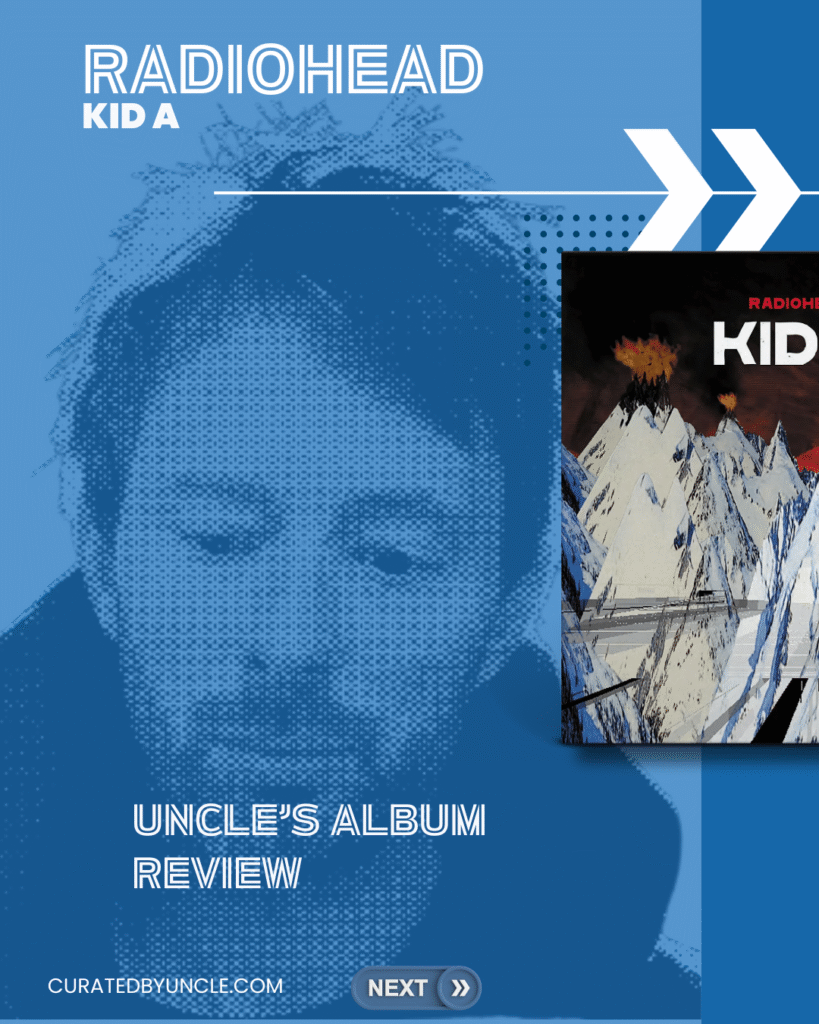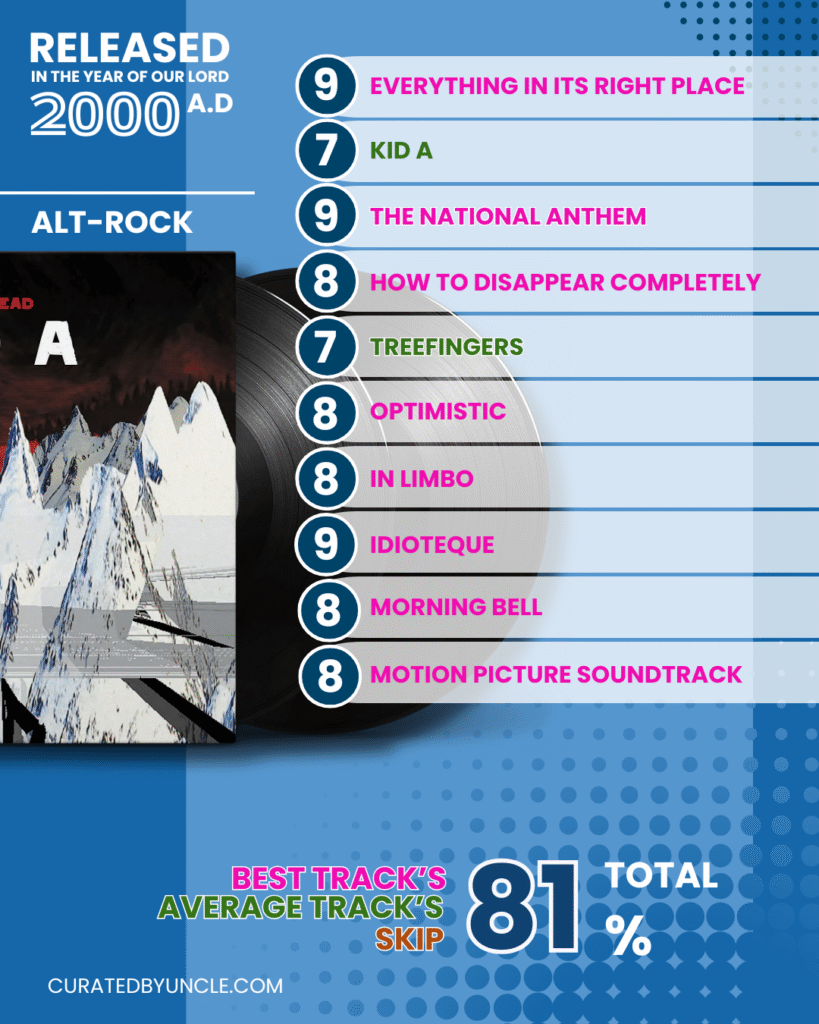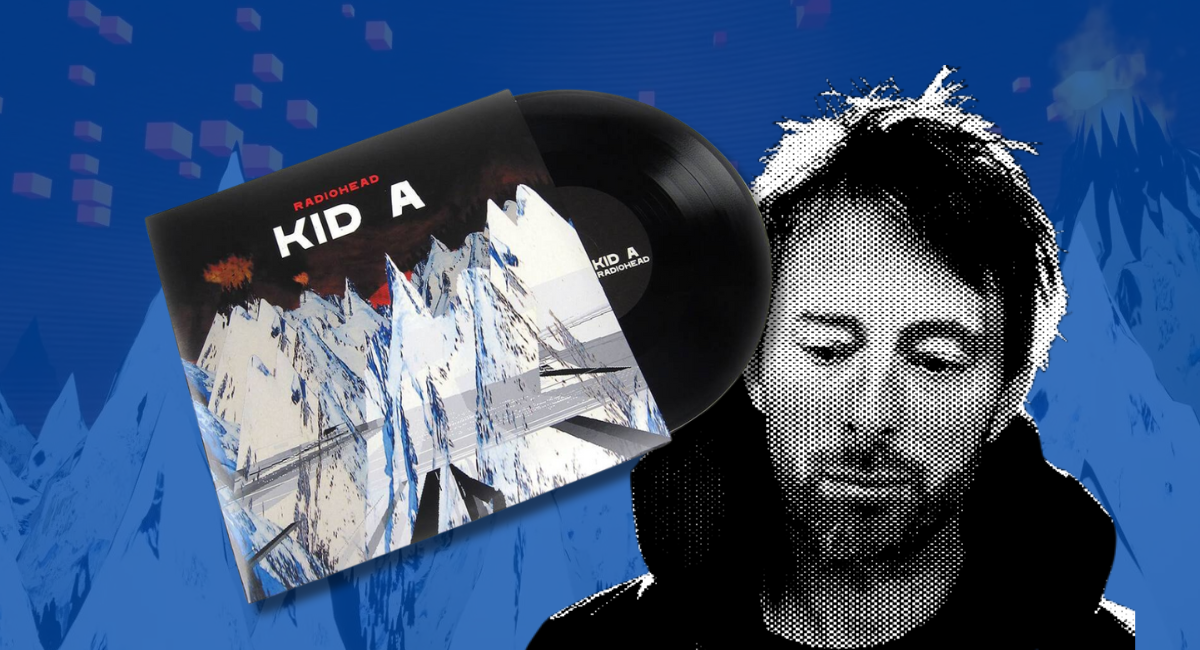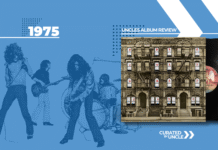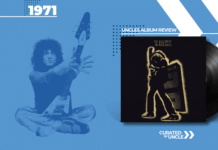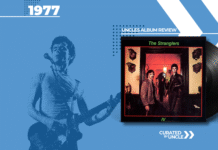Kid A (2000): When Radiohead Broke the Internet (and Themselves)
In October 2000, while the rest of the world was busy failing to recover from Y2K, Radiohead dropped Kid A, an album that sounded less like a rock record and more like HAL 9000 having a nervous breakdown in a haunted glacier. Gone were the guitars. Gone were the hooks. Gone, frankly, was any concern for mass appeal.
And yet, this musical suicide note for commercial rock somehow went platinum. Critics drooled. Fans wept. Conspiracy theorists claimed it predicted 9/11. And it remains, decades later, a monument to Radiohead’s complete unwillingness to play nice – or play guitar like normal people.
If OK Computer was the sound of a system on the verge of collapse, Kid A is what it sounds like when it finally hits the ground and splatters into binary code and ghostly screams.
Table of Contents
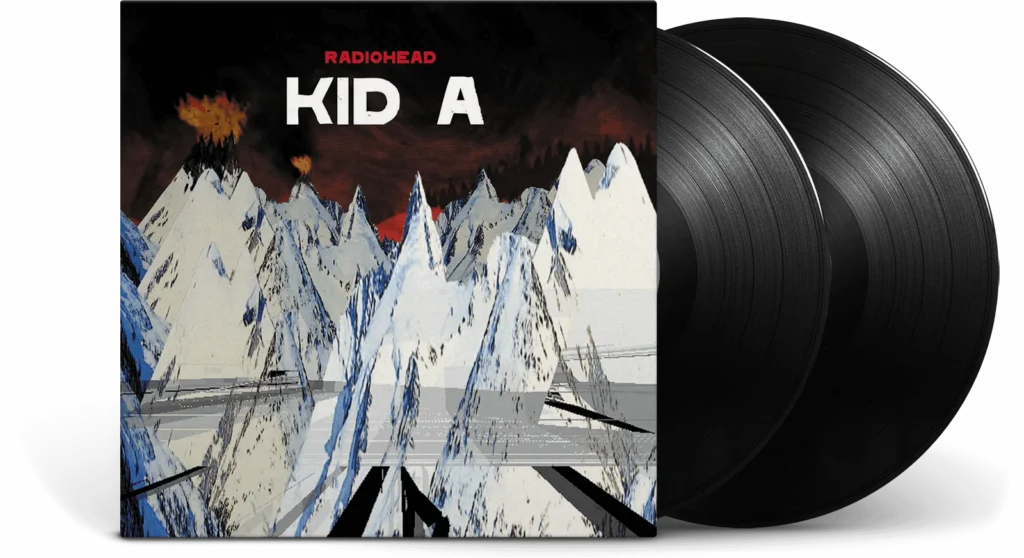
The Mind Behind the Meltdown: Thom Yorke’s Nervous Breakdown Set to Music
Before Kid A, Thom Yorke had reached the kind of artistic peak that most musicians would happily sell their souls, grandparents and favourite limbs for. OK Computer was universally hailed as a masterpiece – and nothing kills creativity faster than being told you’re a genius by everyone from NME to your local dentist. So Yorke, in a mood of radical reinvention, decided to lob a grenade into the centre of Radiohead’s identity.
Ditching guitars like a man sick of their very existence, Yorke dove headfirst into abstract electronics, ambient textures and the sort of paranoid dread normally reserved for people who’ve just Googled “AI uprising symptoms.” He was exhausted, paranoid, disillusioned with fame and possibly allergic to anything remotely crowd-pleasing. In short: the perfect state to make a record that sounds like emotional collapse performed through a malfunctioning mainframe.
Yorke stopped writing lyrics in any traditional sense, preferring scrambled fragments, half-thoughts and lines that feel like they were overheard during an anxiety attack in a digital forest. Vocals were treated, chopped and distorted to the point where they sounded like a lonely robot trying to describe pain without quite having the vocabulary. It wasn’t just a new direction – it was a full-blown rejection of what came before, like if Picasso had gone from painting faces to only drawing haunted microwaves.
The result is Kid A – an album that sounds like someone trying to express trauma using a modem and an ice bath. Beautiful, yes. But also deeply unsettling. If OK Computer was the sound of modern life going wrong, Kid A was the musical equivalent of deleting yourself from the grid entirely. Several of the tracks from Kid A appear on the live album I Might Be Wrong that is featured in our list The 50 Greatest Live Albums Of All Time if you want to check that out after this article.
Track-by-Track Breakdown: An Elegy in Glitches
1. Everything In Its Right Place
If this is the “right place,” I dread to think what the wrong place sounds like. Thom Yorke’s voice is sliced and diced like a malfunctioning AI reciting paranoid haikus. This opener sets the tone: cold, calculated and weirdly comforting – like being tucked into bed by a sentient fridge.
2. Kid A
Muffled vocals. Alien synths. The rhythmic pulse of a dying fax machine. This title track sounds like Yorke recorded his vocals in a submarine filled with bees and regret. And it works. Somehow. It’s like he’s trying to communicate across species.
3. The National Anthem
Fuzz bass that could gut a rhino. A brass section that sounds like it escaped from a jazz asylum. And lyrics that repeat themselves like a man stuck in traffic realising his life has no meaning. An anthem for a nation where no one knows what the hell is going on. Welcome to Earth.
4. How to Disappear Completely
“I’m not here, this isn’t happening.” A gentle acoustic ballad for when you want to mentally detach from the meat sack you call a body. It’s haunting, sad and beautiful – like watching someone cry while dressed as a clown.
5. Treefingers
An ambient interlude. It’s technically music, though your average dad might call it “the sound of a photocopier breaking.” No drums, no vocals – just glimmering ambience like a spa for ghosts.
6. Optimistic
The closest thing to a traditional rock song and even this feels like it’s been dipped in liquid nitrogen. It’s the band throwing a bone to fans of The Bends, before snatching it back with a glare and whispering, “Don’t get used to it.”
7. In Limbo
Drowning never sounded so soothing. Yorke sounds genuinely lost, not in the artsy way – in the “I’ve wandered into IKEA and can’t find the exit” way. Jittery guitar loops, off-kilter drums and the distinct sense that nothing is okay.
8. Idioteque
Danceable dystopia. If Armageddon had a nightclub, this would be its floor-filler. Drum machines jitter, synths shriek and Yorke has a panic attack in real time. “Ice age coming” never sounded so catchy. Humanity’s collapse – but make it funky.
9. Morning Bell
A woozy, off-time lullaby for the dead-eyed masses. Divorce, disassociation and… trousers? Yes, trousers. Somehow, it’s both comforting and disturbing. Like being spooned by a replicant.
10. Motion Picture Soundtrack
A funeral dirge with a harp. Literally. Yorke sounds like he’s dying on a carousel. It closes the album in a wash of distorted nostalgia – the final flicker before the lights go out. Then a minute of silence, as if the band is letting the horror sink in.

Reception at Release: Critical Acclaim and Mass Confusion
When Kid A dropped, it hit the music industry like a ransomware virus. Critics, initially baffled, queued up to declare it the greatest thing since silence. NME wet themselves. Pitchfork wrote a review so glowing it could power a small village.
But fans? Mixed bag. Half hailed it as genius, the other half looked like they’d just watched their dog get vaporised. Some wanted OK Computer 2: Electric Boogaloo. What they got was Blade Runner: The Album with Thom Yorke sobbing in code.
The band refused to release singles. They refused to do press. They barely toured. And yet Kid A debuted at No. 1 on the Billboard 200 – because nothing sells quite like abject despair.
Cultural Impact: The Album That Predicted the Future (Poor Us)
Kid A isn’t just an album. It’s a premonition in WAV format. Released in a year that still thought flip phones were futuristic, it predicted a decade of alienation, online paranoia and emotional collapse – all with the emotional warmth of a wet MRI scanner.
Artists like Bon Iver, James Blake, Kanye West and even Lorde have cited Kid A as a gateway drug to embracing weirdness. It helped deconstruct the idea that guitars = rock and lyrics = logic. Suddenly, having a panic attack while whispering over drum loops was art.
In hindsight, Kid A sounds less like an anomaly and more like a prophecy. It’s Spotify-core. It’s algorithm-resistant. It’s the musical equivalent of looking in the mirror and not recognising yourself, then realising that’s the point.
Is Kid A a Concept Album – Or Just the Musical Equivalent of Crying in a Server Room?
There’s a longstanding debate about whether Kid A has a grand narrative or if it’s just 47 minutes of exquisite confusion. The album doesn’t explain itself. There’s no tidy resolution. Just tension, abstraction and the occasional moment of bleak beauty. It’s like a museum exhibit designed by someone who’s never felt joy but owns a lot of synthesisers. And in an age where we’re all constantly trying to make sense of nonsense – whether it’s politics, tech, or why your smart fridge now sends you ads – Kid A feels more relevant than ever.
It’s not a concept album in the way The Wall is. It’s a concept album in the way falling asleep with the TV on feels like a dream you didn’t ask for but can’t forget. Welcome to the sound of everything and nothing, all at once.
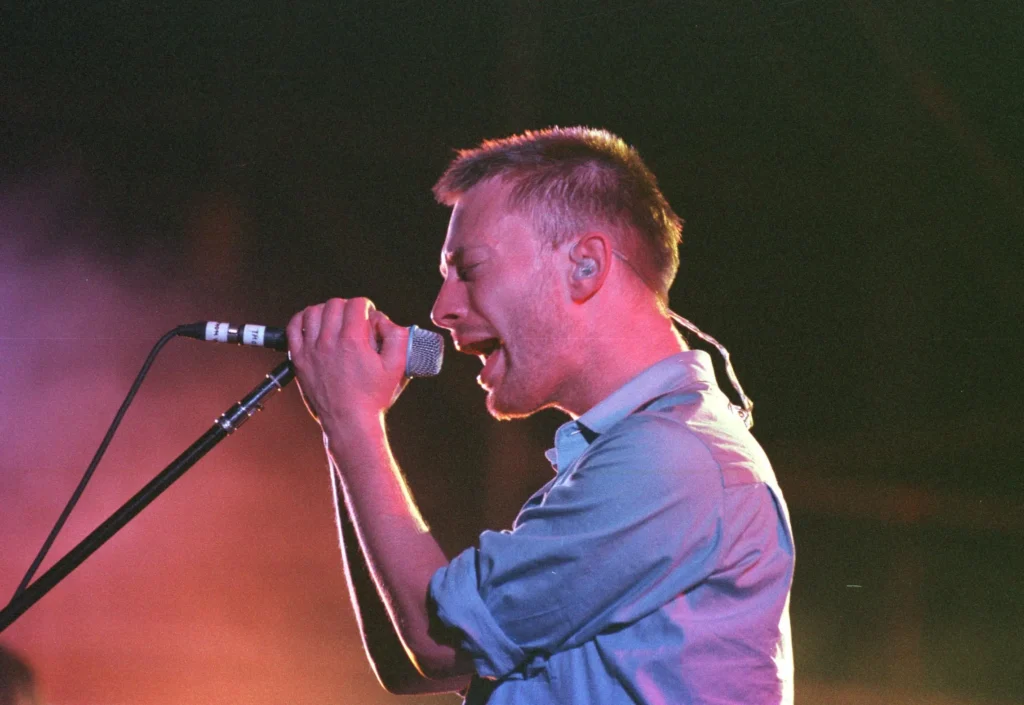
Why Kid A Still Matters (Even If It Feels Like a Headache in HD)
Let’s be honest: Kid A isn’t fun. It doesn’t “rock.” You won’t hear it at a wedding unless it’s a very avant-garde one. It doesn’t lend itself to karaoke, unless your idea of entertainment is mumbling through reverb while friends stare in horror. And yet, despite all of that – or perhaps because of it – Kid A remains one of the most important albums of the 21st century.
Why? Because it was brave. Not in the showy, U2 kind of way where the band winks at its own cleverness, but in the quietly deranged way where a group at the height of their powers deliberately made something alienating, bleak and genuinely unsettling. It didn’t chase trends – it ran screaming in the opposite direction while throwing synths at the wall.
Kid A helped destroy the idea that a band needs to sound like itself. It shattered the safe template of indie rock, replacing it with something spectral and disjointed. And it influenced just about everyone with access to a laptop. From Kanye West’s 808s & Heartbreak to Billie Eilish’s whispered nightmares, the shockwaves of Kid A are still being felt by confused listeners and sound engineers everywhere.
The album also forced fans to grow up – or at least evolve their tastes beyond power chords and angst. It rewarded patience, repeated listens and the willingness to sit in discomfort. This wasn’t background music, it was a test. One that half the audience failed in 2000, but many have since passed – sometimes grudgingly.
In short, Kid A matters because it made weirdness aspirational. It proved that not knowing what the hell you’re doing can still produce a masterpiece. Which is probably the most comforting message Radiohead has ever accidentally delivered.
Trivia & Fun Facts: Kid A for the Obsessive Neurotics
- Thom Yorke recorded the vocals for “Kid A” through a vocoder while lying on the floor, because of course he did.
- The lyrics to “Everything In Its Right Place” were written after a breakdown Thom had post-OK Computer tour. He claimed he couldn’t speak for days. Naturally, he turned that into a single.
- The brass section on “The National Anthem” was told to “play like they were a traffic jam.” Which they absolutely nailed.
- No singles were officially released, because Radiohead are that kind of difficult.
- The band created fake websites and digital ephemera to promote Kid A, pioneering internet marketing when most bands were still sending faxes.
- The title “Kid A” may refer to the first cloned human. Or an unborn child. Or a computer. Or nothing at all. Cheers, Thom.
- Pitchfork gave the album a 10.0, and basically collapsed into a puddle of reverent goo.
My Final Thoughts: The Album That Broke Rock and Fixed Nothing
Kid A is not your friend. It doesn’t want you to sing along. It doesn’t care if you’re sad. It doesn’t care if you’re happy. It doesn’t care if you’re there at all.
It’s a record that stares back at you, coldly, while whispering that your emotions are irrelevant in the face of entropy. It is, in short, a masterpiece of discomfort. And like all great art, it makes you feel something very specific: unease.
In a post-Kid A world, being weird is no longer brave – it’s necessary. We’re all Thom Yorke now: twitching in the dark, speaking in glitch and praying everything stays in its right place – even if it never was.

If You Like Kid A, I Recommend These Albums:
Radiohead – Amnesiac (2001) – Kid A’s sleep-deprived sibling – jazzier, sadder and somehow even more cryptic, like a diary written during a blackout.
Björk – Vespertine (2001) – Imagine if your laptop fell in love with a snowstorm – fragile, glitchy intimacy with bonus harp.
Aphex Twin – Selected Ambient Works Volume II (1994) – Music for when your walls feel sentient and slightly disappointed in you – ambient unease at its finest.
